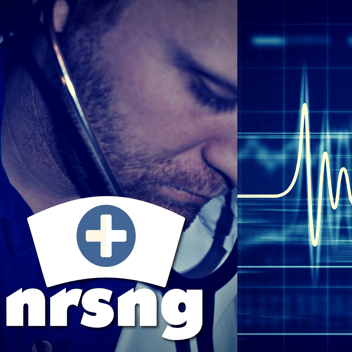What Do They Want Me To Know On The NCLEX? | Test Taking
%20(12).png)
Wouldn’t it be nice to get into the “mind” of your NCLEX exam . . . know exactly how to answer the question? Know exactly what the heck they want me to know?
In this post, I am going to be talking about understanding what they really want you to know, and what is really being asked in the question.
In fact, I am going to give you 4 tips to help you understand that.
It's going to sound dramatically oversimplified but I promise I'm telling you guys, this is what more students struggle with than anything else.
Honestly, it was one of my major setbacks as a test taker . . . doing this thing. When I took my test, I tell you, I took thousands and thousands of practice questions for the NCLEX . . . I've taken so many practice questions, and this one thing is STILL probably my biggest downfall as a test taker.
So what do you need to do? You need to determine what is really being asked. To do this you need to read every single word of the question.
If you're totally lost when you're reading a question, read the very last part of the question right before the question mark.
You can get a huge question. It can be a paragraph long or even more. It can be talking about all kinds of things. The patient's family, their birthdate, the social security number, where they're from, it doesn't matter, but all they really wanted to know is the lab value. You know?
So if you read an entire question, I want you just to read the last part right before the question mark, because that's gonna tell you what the question really wants to know.
So there are two things you need to do.
You need to read the entire question, and if you get lost, read the part right before the question mark.
Let me give you 4 tips to help you determine what's actually being asked on the question.
Remove distractors
You're gonna find in many questions that there are a lot of answer options that are just clearly wrong. I want you to get those out of your mind. Look beyond them and don't even think about them anymore.
This is incredibly important because if you don't remove those, you can kind of get stuck continually looking at them and evaluating them as real options. So read your answer options, use some of the other strategies we've already talked about, and then eliminate all the distractors. The ones that are clearly wrong, clearly not right?
Simplify the question
Let's say they have a question about cirrhosis, a very complex disease process, and you're not exactly sure what's going on. You’re not sure what you're looking for. Just go back to anatomy and physiology.
You remember where the liver is, you remember what the liver does. Do you remember some of the functions of the liver? What is anatomy physiology? Where is it? What does it do? What's the pathophysiology of the liver? How does it do what it does? Why does it do what it does? And just really simplify it down to the simplest component. Go back to something that you already know and start from there.
Don't overthink
Look, there's not a lot to be said here, but don't overthink. What I mean by this is what happens with a lot of test takers, myself included, is we overthink. We overthink the question. We’re asked a very, very simple basic question, and then we’re given one answer option that's just kind of out there, a little weird, and you start to extrapolate.
You start saying, well, if this happened and what's going on and on a full moon, then this could be right, possibly. Maybe they're trying to see if I understand X, Y, or Z. And you start creating these, these elaborate stories in your mind to make this answer option right?
The moment that you hear yourself starting to say, well maybe, you're starting to overthink, and I want you to stop.
Overthinking and not reading the entire question, we're honestly my biggest downfalls. I would say that that question's way too easy . . . like surely it's more difficult than this, and I started to create all these stories.
Determine if they're asking for the correct or the incorrect answer option
Throughout your entire educational journey, You've always been asked what is the correct answer. Whether you're a first-time college student, in high school, whatever, every test you've ever taken, anatomy and physiology, it doesn't matter, You've always been asked for the correct answer.
But now that you're in nursing school, they're starting to ask you what the incorrect answer is. They want to know what you wouldn't do, what you shouldn't say, what you can't do. And those are really these higher-level analysis questions.
They're much more difficult because you're piecing together a lot of information because you definitely do not want to do this thing, or you always must avoid certain things with certain patients, certain disease processes.
This really comes down to reading the entire question, and you need to read from the first word of the question to the very last word of the sentence. What they're going do at the very end of the question is they're gonna say all of the following are true except, or, which one of these patient responses indicates a need for further teaching?
We just haven't ever really been tested like this. We've never been told to look for incorrect answers. And so it's very counterintuitive for us.
Let’s review these 4 tips
- Remove all the distractors
- Simplify the question down to its most simple base
- Don't overthink it
- Are they asking for correct or incorrect answers
These tips could really change your entire trajectory as a nurse just by helping you understand what's being asked so that you can answer the question the way you should.
To get more test-taking strategies visit NURSING.com
You CAN Do This!
Happy Nursing!




%20(13)-png.png?width=600&height=315&name=Professional%20Build%20Your%20Business%20At%20Home%20Blog%20Graphic%20(1200%20%C3%97%20630%20px)%20(13)-png.png)
%20(14)-png.png?width=600&height=315&name=Professional%20Build%20Your%20Business%20At%20Home%20Blog%20Graphic%20(1200%20%C3%97%20630%20px)%20(14)-png.png)
%20(15)-png.png?width=600&height=315&name=Professional%20Build%20Your%20Business%20At%20Home%20Blog%20Graphic%20(1200%20%C3%97%20630%20px)%20(15)-png.png)
%20(16)-png.png?width=600&height=315&name=Professional%20Build%20Your%20Business%20At%20Home%20Blog%20Graphic%20(1200%20%C3%97%20630%20px)%20(16)-png.png)


